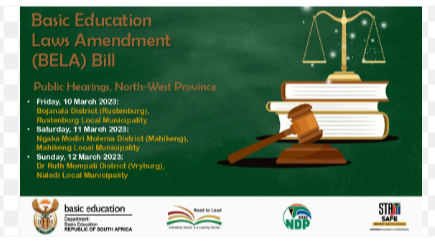The Basic Education Laws Amendment Act (BELA) in South Africa represents a significant milestone in education legislation. This comprehensive amendment aims to enhance various aspects of schooling, from language policies to learner rights.

Understanding Basic Education Laws Amendment Act (BELA) South Africa: An Overview
Contents
What is Basic Education Laws Amendment Act (BELA) South Africa?
The BELA Act introduces crucial changes to the South African Schools Act (SASA) of 1996. Key provisions include:
- Compulsory Attendance: Grade R learners are now required to attend school.
- Language Policies: The Act empowers the Education Department to determine a school’s language policy and curricula.
- Prohibition of Corporal Punishment and Initiation Practices: The BELA Act prohibits corporal punishment and harmful initiation practices.
- Inclusion of South African Sign Language: South African Sign Language gains official status for learning in public schools.
- Admission Policies: Public schools’ admission and language policies must be submitted for approval.
- Code of Conduct: School codes of conduct consider cultural beliefs, religious observances, and medical circumstances.
- Facilities and Resources: The Act addresses facilities, budgeting, and resource allocation.
The Importance of Basic Education Laws Amendment Act (BELA) South Africa
The BELA Act ensures equitable access to quality education, fostering a conducive learning environment for all learners.
Basic Education Laws Amendment Act (BELA) South Africa
For the official text and details, visit the BELA Bill.
Address and Contact Information
For inquiries, contact the South African Department of Basic Education.
Resources Basic Education Laws Amendment Act (BELA) in South Africa
Resources Basic Education Laws Amendment Act (BELA) – South Africa details: From here you can easily check Resources Basic Education Laws Amendment Act (BELA) information in South Africa.
This article is completely about Resources Basic Education Laws Amendment Act (BELA) details in South Africa. Candidates who are looking for the Resources Basic Education Laws Amendment Act (BELA) here and there on the internet, they can stop your search and take a look at this article once. In this web page, we had provided important information and link to the Resources Basic Education Laws Amendment Act (BELA). Get connected with us for Resources Basic Education Laws Amendment Act (BELA) latest updates.
South Africa Department of Basic Education was formed when the former National Department of Education was split into two: Department of Basic Education and the Department of Higher Education and Training. The DBE deals with all schools from Grade R to Grade 12, including adult literacy programmes. The aim of the DBE is to develop, maintain and support a South African school education system for the 21st century.
Our vision is of a South Africa in which all our people will have access to lifelong learning, education and training opportunities, which will, in turn, contribute towards improving the quality of life and building a peaceful, prosperous and democratic South Africa.
Our mission is to provide leadership in the establishment of a South African education system for the 21st century.
Resources Basic Education Laws Amendment Act (BELA) in South Africa.
READ ALSO: Jobs in South Africa
For more information Visit https://www.education.gov.za/
Conclusion
The BELA Act represents a progressive step toward an inclusive and effective education system in South Africa.